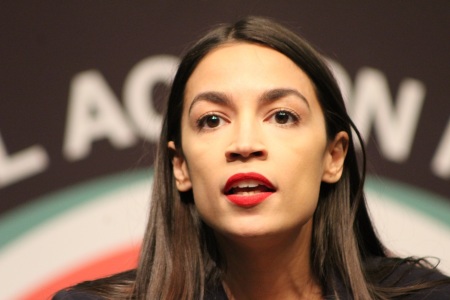Ocasio-Cortez says Muslim, Christian prayers 'go to the same place'

Rep. Alexandria Ocasio-Cortez said that both Christian and Muslim prayers “go to the same place” during the first-ever congressional iftar, the meal that breaks the fast at sundown each day of the Muslim holy month of Ramadan.
On Monday, three Muslim members of Congress hosted an iftar at the U.S. Capitol, attended by about 100 guests from various religious backgrounds, The Washington Post reports.
During the event, Ocasio-Cortez, D-N.Y., a professing Catholic, talked about attending Friday prayers at mosques in her district, which includes a substantial Muslim population in the Bronx and Queens.
She said: “When [Rep.] Ilhan [Abdullahi Omar, D-Minn.] prays, when I pray, when [Rep.] Rashida [Tlaib, D-Mich.] prays, when Ayanna [Pressley] prays, when Jan Schakowsky prays, I believe those prayers all go to the same place — up.”
House Majority Leader Steny H. Hoyer, who also attended the event, similarly mixed religion and politics, stating: “The Bible doesn’t tell me to love my neighbor if they’re Christian, if they’re straight . . . The Bible tells me to love my neighbor.”
Monday’s iftar was organized by the nonprofit Muslim Advocates in coordination with the offices of Omar, Tlaib — the first two Muslim women in Congress — and Rep. André Carson, D-Ind. The gathering to break that day’s Ramadan fast was the first iftar to be hosted by Congress’ own Muslim members.
With the exception of 2017, the White House has hosted an iftar every year since 1996, when then-First Lady Hillary Clinton oversaw an event.
Last week, President Donald Trump hosted his own iftar at the White House, highlighting Ramadan as “a time of charity, of giving and service to our fellow citizens,” and one in which to become closer as families and communities.
“We thank God that America is a place founded on the belief that citizens of all faiths can live together in safety and live together in freedom,” he said. “As we prepare to dine together this evening, let us pray for a future of harmony and peace. Let us ask God to forever shine His goodness and blessings upon us. And let us continue to work together to build a future filled with hope and goodwill for our children and for all of the people of the world.”
The question of whether Christians and Muslims worship the same God has been the topic of heated debate in recent years, with numerous theologians and biblical scholars weighing in on the issue.
In 2016, political science professor Larycia Hawkins parted ways with Wheaton College after she was placed on administrative leave for declaring Christians and Muslims worship the “same God.” The context was her decision to wear a Hijab during advent to show solidarity with Muslims.
School officials later wrote they made an “error in judgment” in handling her remarks and have named a scholarship after her. A task force subsequently issued a report concluding that they could not decisively say whether or not Hawkins' theological views aligned with the school's doctrinal statement of faith.
But recently, Southern Baptist Convention President J.D. Greear said the Christian and Muslim ideas of God are irreconcilably different.
“Islam is a false way of salvation,” he emphasized. “Islam presents salvation by works, and it outright denies several key things that Christianity teaches about God, like God being a Trinity and the personal nature of God and more.”
Still, it’s possible to work from some shared assumptions about God in missional conversations with Muslims, Greear said.
Missionaries on the field, Greear explained, seek to tell people “that this God that we believe has created the world, has been speaking through the prophets, and has revealed himself fully in Jesus.”
“He is a Trinity,” he said. “And Muhammad is not an accurate prophet of him. If somebody explains their statement in this way, I have less problems with them saying Christians and Muslims are attempting to worship the same God, but in two entirely different ways.”
Nabeel Qureshi, the late author of Seeking Allah, Finding Jesus, previously stated that while Muslims and Christians do not worship the same God, “we all ought to stop demonizing those who disagree with us” given the complexity of the matter.
“Christians worship a Triune God: a Father who loves unconditionally, an incarnate Son who is willing to die for us so that we may be forgiven, and an immanent Holy Spirit who lives in us,” he said.
“This is not what the Muslim God is; it is not who the Muslim God is; and it is not what the Muslim God does," he added. "Truly, the Trinity is antithetical to Tawhid, fundamentally incompatible and only similar superficially and semantically. Muslims and Christians do not worship the same God.”





















